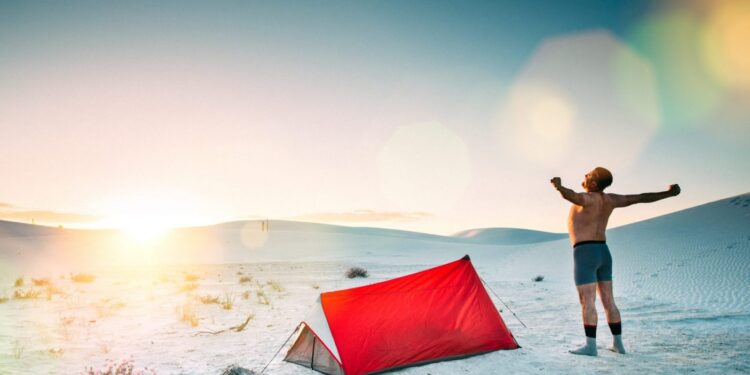Camping in the desert can be a unique and fantastic experience when you know what you are doing. Despite most people picturing camping only in lakes, forests, and mountains, the beauty of red mesas and mysterious hoodos can also be fascinating.
However, due to the harsh climate and terrain, you will need some extra preparations and special precautions. If you are planning to head to the dessert, here are some 9 desert camping tips.
If you’re looking to make your camping trip easier, check out our guides to camping beds, camping kettles, camping stoves and camping essentials.
Bring more water than you think you need
In an arid climate, you will need more water than you would in a humid climate. On the other hand, you can’t count on springs and creeks since they may be a few and very far between.
Therefore, you should remember to carry enough water and also drink it frequently to avoid getting dehydrated. A good rule of thumb to follow is a gallon per person per day or even twice that volume to be on the safe side.
Don’t forget necessities
It is very important to make a checklist of some important items that you will need other than food, water, and clothing. These may include plenty of powerful insect repellent, sunscreen, flashlights with enough batteries, a portable air conditioner, a few lighters, a spare tire just in case you get a flat tire.
Getting lost in the desert is a nightmare; make sure you pack a physical map, a star chart, and a compass just in case your phone and GPS devices fail to work.
Respect the wildlife
It is important to research the wildlife in an area before going camping there. Desserts are homes to several creatures including many species of snakes, foxes, lizards and scorpions. However, most of these incredible creatures are harmless unless provoked. You should, therefore, watch your every, avoid poking holes in rocks, and always shake your boots before putting them on to prevent being bitten.
(image src: https://pixabay.com/en/camping-campsite-outdoors-tent-504661/)
Also be careful when near springs, on dirty paths, and shoulders of paved roads as this are where rattlers and other snakes like to sun themselves. Although camping with your pet might seem enjoyable, deserts are never good for pets due to plants with spikes and needles, and other predators.
Be energized
Although your body will need more fuel as you get to explore the desert, the sun may ruin your appetite. Instead of dividing your food into breakfast, lunch, and dinner, you should try to snack throughout the day to avoid going hungry and weak.
Carry some plenty of protein bars, carbohydrates such as breads and crackers, dried fruits and nuts. This will help your body get the fuel it needs to meet its daily demands.
Prepare for cold weather
Deserts have a low humidity thus hot during the day and chilly at night. In some cases, the temperature at night can go even below the freezing point.
You should prepare for this by bringing with you some cold-weather clothing, extra blankets, weather-appropriate sleeping bag, heavy gloves or mittens, and hats covering the ears just in case the wind starts to whip.
Live like the locals
Many desert animals are most active at dusk and dawn when the sun is not very hot. You can also become more comfortable when you adapt this strategy. Keep most of your activities to the early and late hours of the day and just hangout during midday when it’s hottest.
Pay attention to your tent
When erecting a tent, the main challenges that you should keep in mind are the wind and heat. Desert tents should be set on high ground but not on mountain tops. Hammock camping would be more suitable for protection from ground animals.
You should also pitch your tent in a shade or try to cover it with an opaque tarp. This will prevent the sun from melting plastics and glue during the day when its intensity is high. Also, never lace your tent perpendicular to the wind as it will make it flap violently and noisily.
Leave no trace
After camping in the desert, it is important to take all your trash and waste with you. This is because deserts despite seeming barren, they are actually very delicate ecosystems. Its climate slows down decomposition of wastes drastically. Also, avoid disturbing plants and crusty soil as both are very important and sensitive to trampling.




